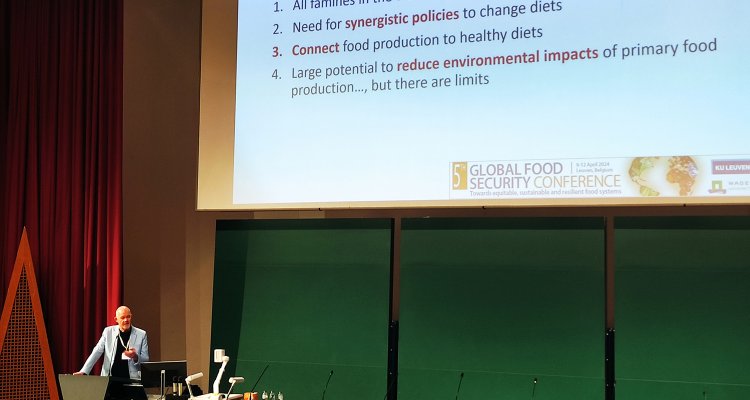
Interview
Global Food Security Conference concludes: 'Broad view on food security and food systems important'
Earlier this month, the fifth edition of the Global Food Security Conference took place in Leuven. Over 500 participants from 65 countries interacted to discuss food security and food systems. Professor Martin van Ittersum, Professor of Plant Production Systems at Wageningen University & Research, co-hosted the conference. He looks back on the conference with great satisfaction.
How do you see the importance of this Global Food Security Conference?
The conference is of great significance. It brought together scientists from all disciplines and areas of interest related to food security and food systems, ranging from agronomists to nutritionists, and from historians to economists and policy experts. We are all working on the same theme, albeit from different perspectives and using different methods. The congress facilitated to provide a broader, integrated view of food systems, and that is crucial for solving problems.
What are the main lessons to be learned from the conference?
There was a strong consensus at the conference that we need to stop doing the bad things, such as overconsumption and overuse of inputs, but we should not lose sight of the positive aspects of current systems, such as land-saving production and the importance of realizing in many parts of the world a stable availability of healthy and safe food. It is too easily said that the entire food system needs to be 'transformed', and we must be careful not to throw out the baby with the bathwater, as echoed by several contributors.
Another important lesson that can be drawn is that as scientists, we should focus more on which goals we want to achieve and less on how we want to achieve them. We should talk less in terms of buzzwords such as ‘nature-inclusive’, ‘regenerative’ and ‘all plant-based’, and more about their effects on the goals, such as land use, emissions and health. There is no single farming method that works optimally everywhere, just as there is no one solution to achieve less consumerism (less animal protein, for example) with food policy.
Were all these aspects adequately covered during the conference?
With the presence of 65 nationalities and much diversity within those countries, I believe, the conference offered a rich and varied presentation of knowledge and discussion. Moreover, a large proportion of the attendees were relatively young, and almost 60 percent female.
How do you see the future of the conference?
Regarding the future of the Global Food Security Conference, we are considering shifting the focus from food security to food systems as a whole. This shift has already been visible in recent years. In 2013, the focus was still largely on production, but now it is already much more balanced. Therefore, we are considering changing the name of the conference to Global Food Systems Conference.
The next conference is expected to take place in late 2026 or early 2027. The organizing committee is currently exploring potential venues in South or Southeast Asia, or Latin America.